The Government has designated croquet as one of only a handful of sports approved to resume play in May as lockdown restrictions start to ease. Croquet earns its place in this special group as an organised outdoor sport, co-ordinated by a national governing body, which is played with full social distancing.
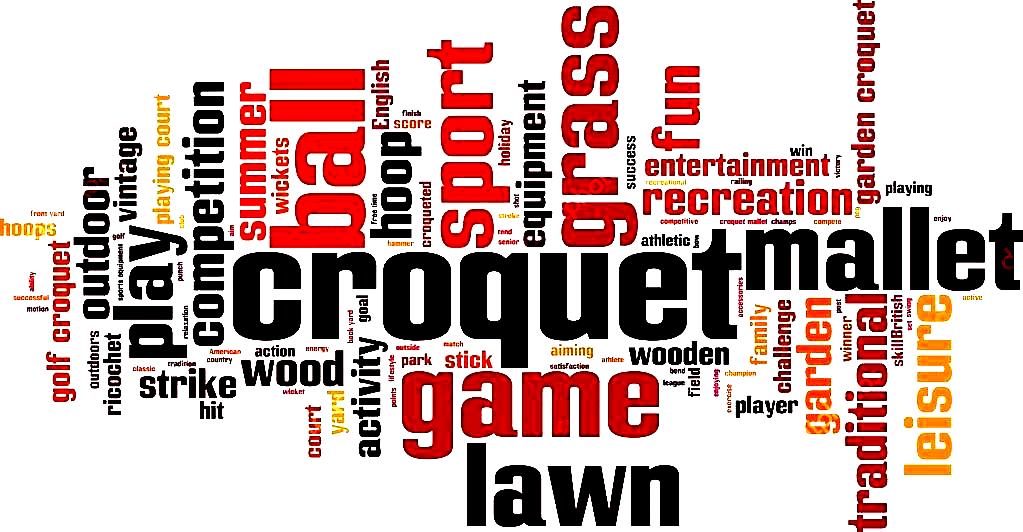 A special Croquet Association task group has been working closely with Whitehall to hammer out safe conditions for returning to the lawns. Clubs need to ensure that all equipment is cleaned, that agreed limits on the numbers per lawn are strictly followed, and that all players are fully aware of the need to keep to the new rules at all times. Clubs are responding by planning to loan mallets, invite designated people to set up lawn equipment, and introduce on-line lawn booking.
A special Croquet Association task group has been working closely with Whitehall to hammer out safe conditions for returning to the lawns. Clubs need to ensure that all equipment is cleaned, that agreed limits on the numbers per lawn are strictly followed, and that all players are fully aware of the need to keep to the new rules at all times. Clubs are responding by planning to loan mallets, invite designated people to set up lawn equipment, and introduce on-line lawn booking.
Croquet is likely to prove a lifeline for Club members, benefiting as it does both physical wellbeing and mental wellbeing, and addressing social isolation. The game is enjoying a revival and the Government’s decision to allow it to be one of the very first sports to resume can only help to accelerate its further growth.
May 2020
A group of 50 enthusiastic croquet players drawn mostly from the Yorkshire Federation went to the new Countryfile Live at Castle Howard to give visitors to the four day event the opportunity to “give croquet a go”. Two small croquet lawns were set up on the Castle Howard front lawns with the magnificent house in the background, and 1500 people tried their hand at running hoops with some expert guidance. All the visitors seemed to enjoy it; any serious interest was captured and links are being made to clubs for follow up.
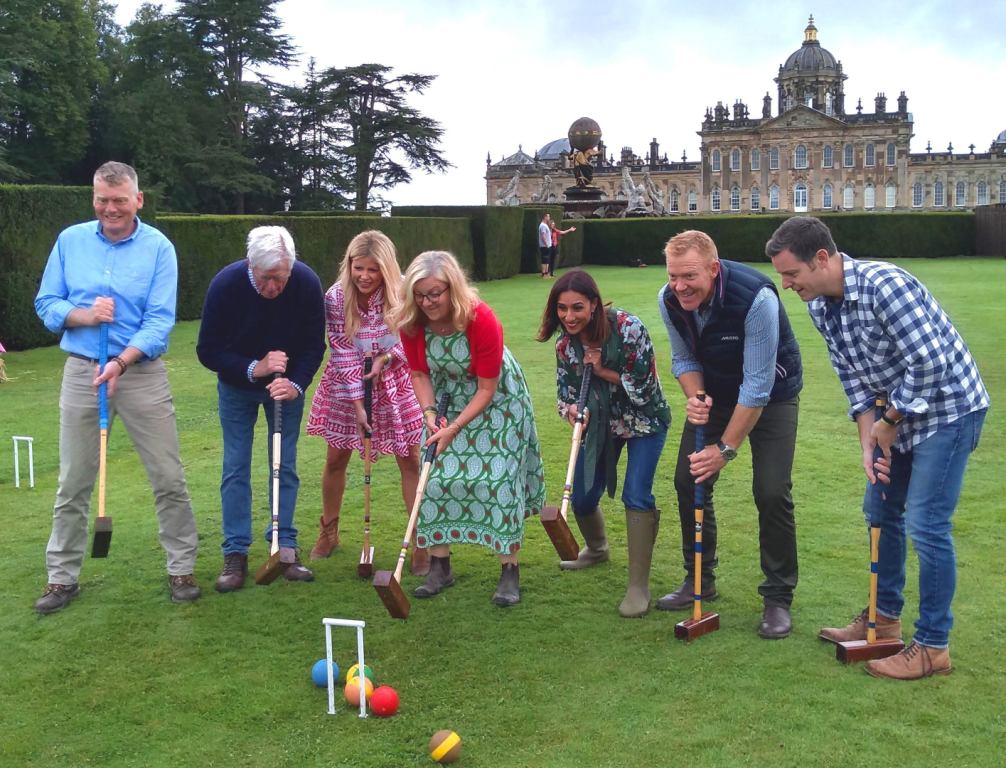 The BBC Countryfile Live team of presenters get in some hoop running practiceThe weather was variable and as the show lasted from 9 am to 6 pm on each day the volunteers worked hard, with some time off to enjoy the rest of the show themselves.
The BBC Countryfile Live team of presenters get in some hoop running practiceThe weather was variable and as the show lasted from 9 am to 6 pm on each day the volunteers worked hard, with some time off to enjoy the rest of the show themselves.
It is always difficult to assess the long term impact of this sort of activity, but 1500 is a “serious” number of players, and there is no doubt that the team of volunteers raised the public profile of croquet amongst the tens of thousands of visitors to the show. As a result of the relationships built up at Blenheim, the BBC Countryfile Live stars turned up en masse for an early morning publicity shoot and Matt Baker, Ellie Harrison and Adam Henson came back to hone their croquet skills, watched by many of their fans. Some activities were shot on camera: we shall have to wait to see what footage makes it to the Sunday night show.
From the Croquet Association website, August 2019
The third York Open Short Lawn Tournament was fully subscribed, with 24 entrants coming from all over the country, including the south coast and East Anglia as well as all parts of the north. The York Open remains the only short lawn tournament in the Croquet Association Fixtures Book.
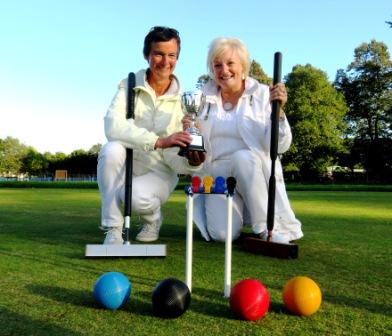 Tina Kelly, 2018 winner, receives the trophy from Debbie James, 2017 winnerThe camaraderie was excellent, strongly aided and abetted by a large Southport contingent and by plentiful supplies of home-made cake.
Tina Kelly, 2018 winner, receives the trophy from Debbie James, 2017 winnerThe camaraderie was excellent, strongly aided and abetted by a large Southport contingent and by plentiful supplies of home-made cake.
York shared the cool weather affecting the rest of the country but enjoyed two days without rain, and the high quality York lawns played well. Runner-up Callum Johnson (playing off short lawn scratch) showed trademark mastery of the lawn throughout the weekend; on his second turn in game 6, with only three balls yet on the lawn, he completed a well-managed all-round break plus two peels on partner ball. But it was one of the Southport contingent, tournament newcomer Tina Kelly, who took home the trophy after two days of consistently calm and careful play with excellent bisque management.
Thanks to tournament manager Dave Hudson for organising 24 people smoothly and efficiently through 10 games, and so providing the ideal framework for an enjoyable two days of croquet, and to the many home bakers whose good works made such an important contribution to a successful weekend.
From the Croquet Association website, September 2018
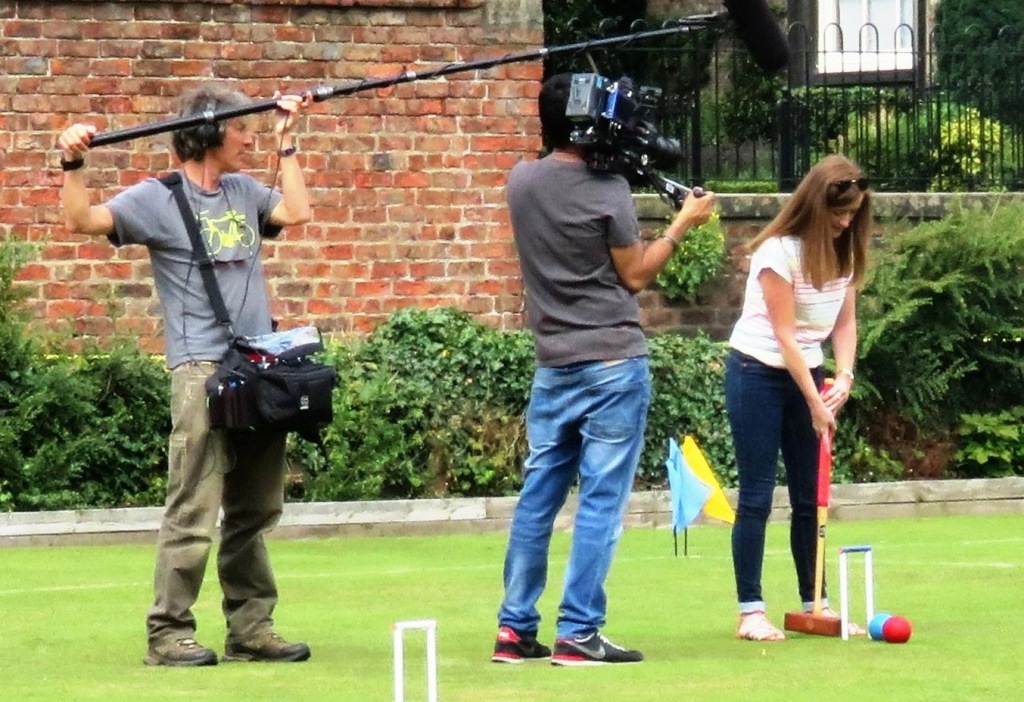 Channel 4 at York Croquet ClubCAMERA – sound – action!
Channel 4 at York Croquet ClubCAMERA – sound – action!
Channel 4 arrived at York Croquet Club in style with full technical support to record an episode of the long-running dating programme Streetmate. The episode featured a young woman and a young man meeting for the first time on the croquet lawn to see whether that special spark would be kindled between them.
Both were trying croquet for the first time. After a close-fought game (which the young lady won) the pair retreated to the lawnside to enjoy a summer lunch, laid on by Channel 4 complete with Pimms, to start to get to know each other better. They then decided, with the cameras still rolling, whether to meet up for a second date.
Recorded June 2017, broadcast September 2017
TEA and cake will be served in York this weekend as some of the country’s most elite croquet players go head-to-head. Spectators are invited to the York Croquet Club lawns in Scarcroft Road where the England Ladies team will take on Yorkshire’s all male team, in a match billed as a Battle of the Sexes.
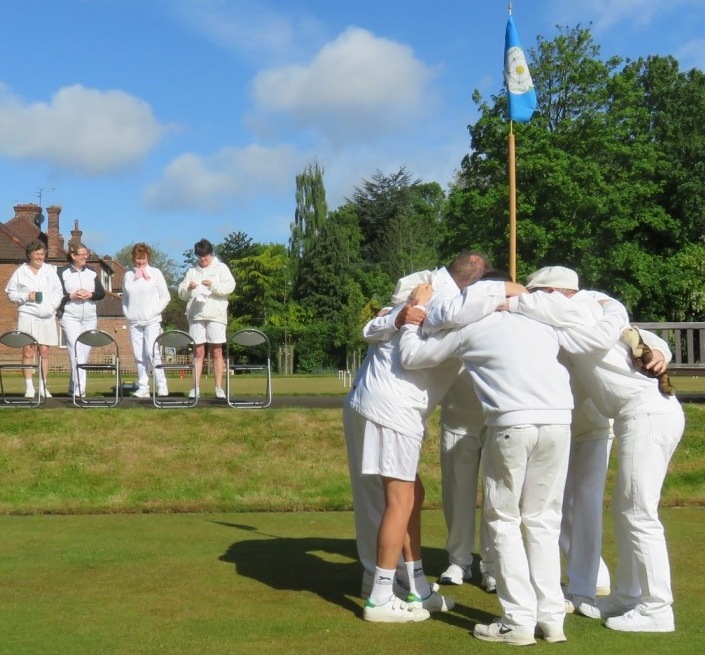 Four of the England Ladies croquet team look on with amusement as Yorkshire get into a 'team huddle' complete with Yorkshire flag and ferretSpectators are invited to attend both the Saturday and Sunday games from 10 am to 4 pm. A simple guide to the game will be made available, while club members are preparing tea and homemade cake for visitors. Each day will feature three simultaneous games in the morning and three in the afternoon.
Four of the England Ladies croquet team look on with amusement as Yorkshire get into a 'team huddle' complete with Yorkshire flag and ferretSpectators are invited to attend both the Saturday and Sunday games from 10 am to 4 pm. A simple guide to the game will be made available, while club members are preparing tea and homemade cake for visitors. Each day will feature three simultaneous games in the morning and three in the afternoon.
John Harris, Chairman of York Croquet Club, said: “This is a great opportunity to see some of the best croquet players in the country playing this engaging game. The Yorkshire team did very well in the Croquet Counties last year and the English Ladies decided they’d like to test their skills against them. Last year they challenged Lancashire and beat them, so there is every prospect of a very interesting series of games.”
Anyone who is heading to the challenge match and wanting to try the game for themselves will be very welcome. Croquet is typically a game of strategy not strength. It is one of the few games played on equal terms regardless of gender or age, and a close result is expected.
Mr Harris added: “Croquet is an absorbing strategic game. Like in snooker, players are trying to build breaks to score more than one hoop in a turn. Often it makes sense for a player to move away from the next hoop and reposition balls in another part of the lawn before returning to run the hoop, which makes the game intriguing to watch.”
From The Press, May 2017
from The Dalesman
Croquet, known as the Queen of Games, is enjoying a UK renaissance. This surge of interest ensures members of Yorkshire’s eleven clubs are in high spirits as they go into the new season, which runs from April to the end of September.
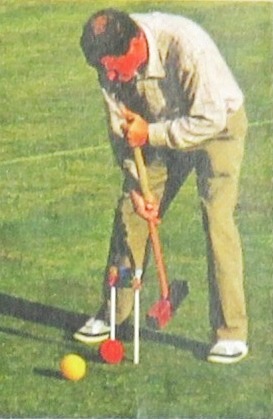 Through the hoopBy common consent, York Croquet Club boasts the county’s finest lawns. Three are in use at the club’s Scarcroft Green headquarters, south of the city centre. “Our membership has doubled in recent years, and looks set to increase further,” says chairman John Harris. “Croquet’s time has come to grow again. It’s a quintessentially English game, delightful on a summer’s day, and a game both sexes and all ages can play on equal terms. It’s strategic, relaxing and enjoyable. We have plenty of capacity and we’re on the lookout for new members.”
Through the hoopBy common consent, York Croquet Club boasts the county’s finest lawns. Three are in use at the club’s Scarcroft Green headquarters, south of the city centre. “Our membership has doubled in recent years, and looks set to increase further,” says chairman John Harris. “Croquet’s time has come to grow again. It’s a quintessentially English game, delightful on a summer’s day, and a game both sexes and all ages can play on equal terms. It’s strategic, relaxing and enjoyable. We have plenty of capacity and we’re on the lookout for new members.”
The origins of croquet are obscure. It seems to have been played in Ireland during the 1830s. “Where it came from before that is unknown,” says John. “It’s a real mystery.” Croquet was introduced to England in the 1850s and a club established in York circa 1870. A firm in the city, Cordeaux and Ernest, made equipment and published the rules of the game, as played at Sheriff Hutton Park. Its heyday, during which croquet parties were fashionable, was curtailed by the 1870s advent of lawn tennis. Despite a brief revival in the Edwardian era, its popularity continued to decline. Now, it seems, croquet is making a comeback.
Ready to roll
Ready to roll
The present York club was formed in 1988 and has been at Scarcroft Green since 1992. The county’s other clubs, affiliated to the Yorkshire Croquet Federation, are at Ben Rhydding, Beverley, Bishop Monkton, Brodsworth Hall, Huddersfield, Lepton, Pickering, Ripon, Sheffield and Shepley. Sheffield has two clubs, one of which has grown enormously in recent years. All stage a variety of internal and external competitions, and some play in county and regional leagues.
In the UK, the main versions of croquet are association and golf. The York club plays the former, featuring six hoops, four balls and a centre peg. Association’s name derives from the “croquet shot”, played with two balls touching. “Association Croquet is strategic and intricate, whereas golf croquet is short and sociable,” explains John. “You’re thinking ahead, trying to build breaks. It has been likened to chess, billiards and snooker, but there are aspects to the game unique to croquet.”
York Croquet Club has sixty members. It hosts sessions at Scarcroft Green on Mondays (10am-noon), Wednesdays (6.30pm-dusk), Thursdays (4pm-6pm) and Saturdays (10am-noon). Formats include singles, doubles, short lawn, full lawn, timed and untimed. To increase participation and improve skills, it offers free drop-in taster sessions on selected weekend afternoons; refresher sessions, early in the season; and, for more experienced players, weekend courses organised by the Croquet Association.
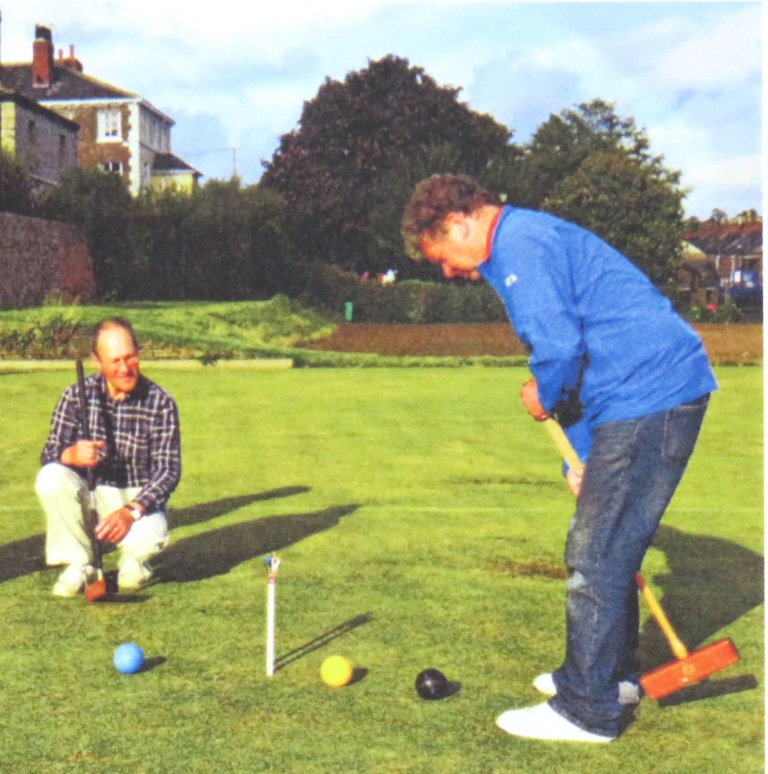 Green and pleasantRowntree Park is the venue for one of the York club’s taster sessions, which feature a simple version of the game. John describes the response as “fantastic”. He adds: “We’ve got a number of people interested in following up from these and our other sessions. We’ve had a lot of international visitors. Meeting them has been very enjoyable. Some are just intrigued by this curious English game; others have heard of croquet and are keen to find out more,” smiles John. “Some say ‘I’ve been meaning to play this game for some time’ and ‘show me how to do it’. Some really take to it and want to know more. It’s a lovely game for a summer’s day, with the sun shining, relaxed company and a game going on in front of you that you’re part of. It’s very enjoyable. I’d say to people: come and try the game, see how it feels and see if it’s for you. We’d be delighted to see you. You’d receive a very warm welcome.”
Green and pleasantRowntree Park is the venue for one of the York club’s taster sessions, which feature a simple version of the game. John describes the response as “fantastic”. He adds: “We’ve got a number of people interested in following up from these and our other sessions. We’ve had a lot of international visitors. Meeting them has been very enjoyable. Some are just intrigued by this curious English game; others have heard of croquet and are keen to find out more,” smiles John. “Some say ‘I’ve been meaning to play this game for some time’ and ‘show me how to do it’. Some really take to it and want to know more. It’s a lovely game for a summer’s day, with the sun shining, relaxed company and a game going on in front of you that you’re part of. It’s very enjoyable. I’d say to people: come and try the game, see how it feels and see if it’s for you. We’d be delighted to see you. You’d receive a very warm welcome.”
Croquet has many fine aspects, not least its handicap system. “The beginner in a short lawn game gets ten bisques, which is ten extra turns,” explains John. “In theory, they could play the world champion and there would be a match on. In practice, you play to your strengths and your ability. You can have an enjoyable game at whatever level of ability you are. Strength has nothing to do with it. Some of the shots are really delicate. The whole point is to so arrange things that all the shots are straightforward. You don’t need big, difficult, heroic shots.”
Despite members playing competitively at various levels, for the York club it is the taking part – not the winning – that counts. “We play for pleasure,” says John. “With the handicap system, we’re always happy for people to get a game in an external league. But it’s about participation and enjoyment. For us, that is more important than being determined to be top of the league at all costs.”
As the new season stretches into the distance, Yorkshire’s croquet community is eager to capitalise on the game’s welcome if long overdue rebirth. “We’re very passionate about croquet,” says John, “so we want to do our bit to help it grow and develop. I feel the game is ready for a big surge forward.”
The Dalesman, April 2016

